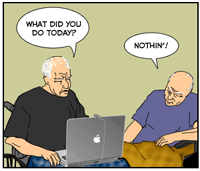I have three “pet projects” (for lack of a better description) at work. They make a little money but not much. One could make a good argument that these are things we shouldn’t be messing with. But I am quite proud of them and today seems like a good time to bench-mark them.
Legislature.com (how lucky were we to get that domain?) has to be one of the more expensive subscription services on the net. We charge $750 a year for a live stream of debate audio from the Missouri House and Senate. All the more amazing since those two bodies offer a live stream for free. In addition to the live stream, we archive each day’s debate. We’ve got it all going back to 2002. Don’t ask me “who cares?” because I don’t know. It’s a little bit of history and it seemed dumb to discard it.
UPDATE: We registered Legislature.com on September 16, 1999. Roger Gardner called me the day before and asked if the domain was available. I assured him someone had snapped it up but had our IT guy (Phil Atkinson) check. Lo and behold, it was available. Not many one-word domains still up for grabs in 1999. Post-Dispatch story on Legislature.com 5/14/00 (PDF)
Supreme Court of Missouri Oral Arguments. Very dry stuff. We stream audio of the oral arguments before the court, and then we archive it. 637 cases, dating back to December 14, 1999. The service has been free until just recently, when we started charging an annual subscription of $99. [We started doing this in January of 2000.
So we have the audio of the state legislature making the laws…and the audio of the state supreme court interpreting many of those laws. While I don’t care that much about the process, saving this audio record just seem very cool to me.
Last, but not least… Missouri State Highway Patrol Crash Reports. These are the initial reports filled out by the state troopers and radioed back to the dispatcher. He or she then enters the information into a computer and it gets distributed to various points around the state. Several years ago, Phil did a little hack that put the reports on a website which, today, easily generates 800,000 Page Views a month. There’s a free, “public” version of the site…and a “premium” subscription service which includes a searchable database of reports going back to the beginning of 2004. Two years of crash reports. God (and maybe Andy and Phil) know how many files that might be. Thousands. Hundreds of thousands? A shit load.
A good businessman would tell you these projects are “distractions” that “dilute” our efforts from our “core businesses.” Which, for the most part, is selling 30 and 60 second commercials on radio networks. I think it’s a credit to our company that they let me (and others) explore these murky, digital waters. But I wonder… if I went to that Big Blogging Convention in the sky tomorrow, would anyone keep these projects going?

 After reading this excellent piece, I can’t get the idea of “unbundled media” out of my head. Like all broadcast media, radio stations offer a bundle of content/programming. Music, weather, sports, news, etc. We bundle it all together in something we call a format and deliver it to the audience (in a very linear manner).
After reading this excellent piece, I can’t get the idea of “unbundled media” out of my head. Like all broadcast media, radio stations offer a bundle of content/programming. Music, weather, sports, news, etc. We bundle it all together in something we call a format and deliver it to the audience (in a very linear manner). Here’s a scenerio: I’m 75 years old and still have most of my marbles but my kids don’t think I should be living alone so we all agree I should move into Sunnyvale Estates where I can get the day-to-day care I need. I have my own room and my one phone-line. Every day I flip open my Thinkpad, log in to my Typepad account, and blog away.
Here’s a scenerio: I’m 75 years old and still have most of my marbles but my kids don’t think I should be living alone so we all agree I should move into Sunnyvale Estates where I can get the day-to-day care I need. I have my own room and my one phone-line. Every day I flip open my Thinkpad, log in to my Typepad account, and blog away.